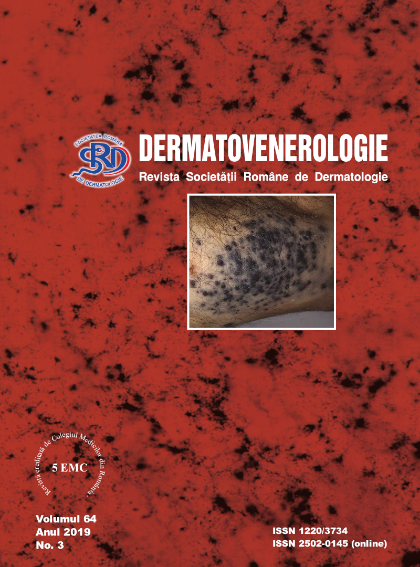Abstract
The development of molecularly targeted therapies
and immunotherapies represents a major breakthrough in
the field of oncology, with major benefits on the quality
of life and progression-free survival of patients. However,
targeted therapies are also associated with important side
effects that can lead to dose reduction or even cessation of
anti-tumor therapy. Dermatological toxicity is among the
most common side effects.
Objective: We aim to describe dermatological adverse
reactions to various novel oncological therapies and to
evaluate their impact on patients’ quality of life, overall
discomfort and skin toxicity-induced depression, using
standardized health questionnaires.
Materials and methods: We conducted a prospective
study of consecutive patients undergoing novel oncologic
treatment with targeted therapies or immunotherapy who
presented dermatologic side effects. Clinical data was
collected by anamnesis and full body examination. Quality
of life was assessed using three internationally validated
questionnaires:
Dermatology Life Quality Index - DLQI, SKINDEX-16,
and Patient Health Questionnaire - PHQ9.
Results: The most common skin manifestation
observed during treatment with epidermal growth factor
receptor inhibitors is the papulopustular rash (100%).
Sorafenib appears to be responsible for the development
of a generalized erythematous macular rash. Nivolumab
causes immune dermatological reactions, such as psoriasis.
Adverse reactions occurring during oncological treatments
have a moderate impact on quality of life and may be
associated with mild forms of depression. Women are more
psycho-emotionally affected than men.
Conclusions: The use of targeted therapies and
immunotherapy is constantly increasing in the management
of oncologic patients in Romania. A better understanding of
the pharmacotoxicological profile of the new agents, their
impact on the patients` quality of life, as well as the correct
management of their adverse reactions could increase the
benefit of these promising therapies.
Original articles
QUALITY OF LIFE IN PATIENTS WITH DERMATOLOGIC ADVERSE REACTIONS TO NOVEL ANTINEOPLASTIC THERAPY


